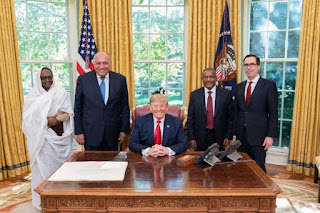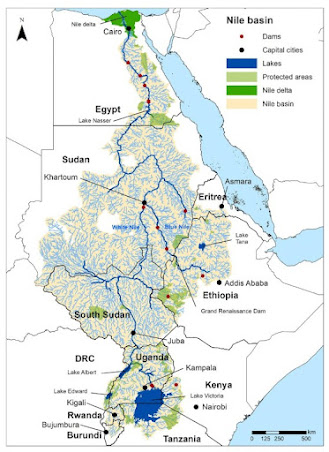Conclusion
Welcome to the last post!
Throughout this blog, I have attempted to cover the complicated hydropolitics of the Nile river Basin, with a focus on the GERD. There a lot of important points that I haven't been able to cover. I will try to briefly go over these in this final post.
Regarding the GERD, I have mainly focused on Egypt and Ethiopia, particularly on how the dam benefits Ethiopia (and downstream countries) as well as how the dam can potentially lead to conflicts, with Egypt looking to protect its interests. What I haven't explored in more detail is the position of Sudan which, bordering both Egypt and Ethiopia, is an interesting one. Sudan stands to benefit more from the GERD than Egypt, as the regulation of the Nile's flow will grant Sudan a "more stable annual electricity production and irrigation water supply" (Heggy et al, 2021). In the first few years after the GERD was announced, Sudan initially sided with Ethiopia but, in recent years, has moved closer to Egypt, going from a more pragmatic to a more confrontational relationship with Ethiopia. Initially in a position of mediator between Ethiopia and Egypt, since 2020, Sudan has moved more towards seeing Ethiopia as a threat (Otinoy, 2022).
Speaking of mediator, this is a point I haven't really touched upon. There have been multiple mediators over the years, some more contested than others. In late 2019 early 2020, the US, under Trump and the World Bank were mediating the dispute. However, Ethiopia viewed the US as partial to Egypt. To appease Ethiopia's concern, the mediation was handed over to the African Union, under the presidency of South Africa in 2020, which unfortunately was unable to resolve the problem either. Egypt and Sudan now support an initiative to pass the mediation on to a quartet: the African Union, the European Union, the UN and the US (Fabricius, 2021). While the US under Biden is seen to be more impartial than under Trump, Ethiopia would prefer if the African Union remained the only mediator.
Ultimately, the issue of the GERD has brought into light the difficulties of political cooperation and water management in the Nile River Basin. Although the dam is still very contentious and a huge problem for regional cooperation, it has forced the riparian countries to dialogue in order to improve political cooperation around the issue of water. With its historical hegemony challenged, Egypt must consider the further increasing developmental needs of the countries upstream, The nation must leave its position as the dominant force in the basin aside, as the rise in power of Ethiopia ensures the Nile River Basin will be a multipolar region, with several countries competing for power and influence.
The GERD can benefit the whole region, but good cooperation and responsible management are needed for everyone to feel the benefits the dam can provide. With still no agreement today, only time will tell if cooperation over the Nile's water will ensure these benefits are distributed.



Comments
Post a Comment